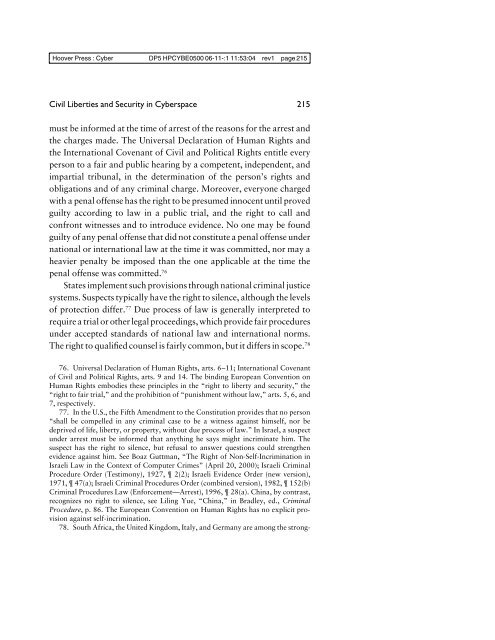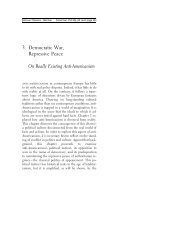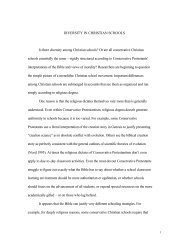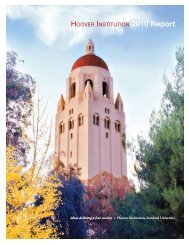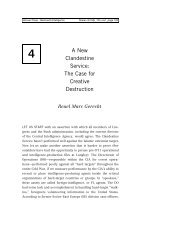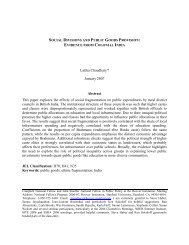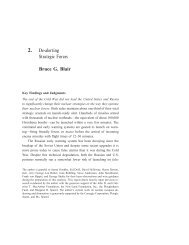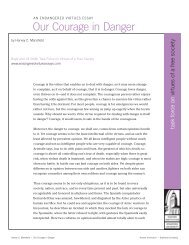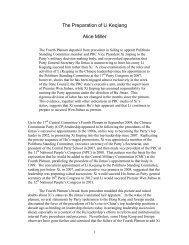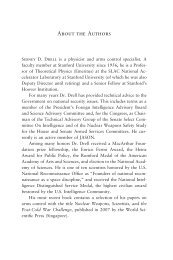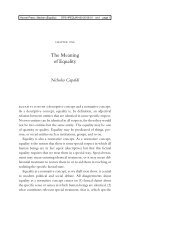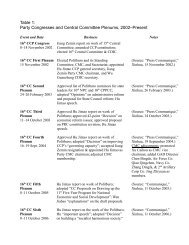Civil Liberties and Security in Cyberspace - Hoover Institution
Civil Liberties and Security in Cyberspace - Hoover Institution
Civil Liberties and Security in Cyberspace - Hoover Institution
Create successful ePaper yourself
Turn your PDF publications into a flip-book with our unique Google optimized e-Paper software.
<strong>Hoover</strong> Press : Cyber DP5 HPCYBE0500 06-11-:1 11:53:04 rev1 page 215<br />
<strong>Civil</strong> <strong>Liberties</strong> <strong>and</strong> <strong>Security</strong> <strong>in</strong> <strong>Cyberspace</strong><br />
215<br />
must be <strong>in</strong>formed at the time of arrest of the reasons for the arrest <strong>and</strong><br />
the charges made. The Universal Declaration of Human Rights <strong>and</strong><br />
the International Covenant of <strong>Civil</strong> <strong>and</strong> Political Rights entitle every<br />
person to a fair <strong>and</strong> public hear<strong>in</strong>g by a competent, <strong>in</strong>dependent, <strong>and</strong><br />
impartial tribunal, <strong>in</strong> the determ<strong>in</strong>ation of the person’s rights <strong>and</strong><br />
obligations <strong>and</strong> of any crim<strong>in</strong>al charge. Moreover, everyone charged<br />
with a penal offense has the right to be presumed <strong>in</strong>nocent until proved<br />
guilty accord<strong>in</strong>g to law <strong>in</strong> a public trial, <strong>and</strong> the right to call <strong>and</strong><br />
confront witnesses <strong>and</strong> to <strong>in</strong>troduce evidence. No one may be found<br />
guilty of any penal offense that did not constitute a penal offense under<br />
national or <strong>in</strong>ternational law at the time it was committed, nor may a<br />
heavier penalty be imposed than the one applicable at the time the<br />
penal offense was committed. 76<br />
States implement such provisions through national crim<strong>in</strong>al justice<br />
systems. Suspects typically have the right to silence, although the levels<br />
of protection differ. 77 Due process of law is generally <strong>in</strong>terpreted to<br />
require a trial or other legal proceed<strong>in</strong>gs, which provide fair procedures<br />
under accepted st<strong>and</strong>ards of national law <strong>and</strong> <strong>in</strong>ternational norms.<br />
The right to qualified counsel is fairly common, but it differs <strong>in</strong> scope. 78<br />
76. Universal Declaration of Human Rights, arts. 6–11; International Covenant<br />
of <strong>Civil</strong> <strong>and</strong> Political Rights, arts. 9 <strong>and</strong> 14. The b<strong>in</strong>d<strong>in</strong>g European Convention on<br />
Human Rights embodies these pr<strong>in</strong>ciples <strong>in</strong> the “right to liberty <strong>and</strong> security,” the<br />
“right to fair trial,” <strong>and</strong> the prohibition of “punishment without law,” arts. 5, 6, <strong>and</strong><br />
7, respectively.<br />
77. In the U.S., the Fifth Amendment to the Constitution provides that no person<br />
“shall be compelled <strong>in</strong> any crim<strong>in</strong>al case to be a witness aga<strong>in</strong>st himself, nor be<br />
deprived of life, liberty, or property, without due process of law.” In Israel, a suspect<br />
under arrest must be <strong>in</strong>formed that anyth<strong>in</strong>g he says might <strong>in</strong>crim<strong>in</strong>ate him. The<br />
suspect has the right to silence, but refusal to answer questions could strengthen<br />
evidence aga<strong>in</strong>st him. See Boaz Guttman, “The Right of Non-Self-Incrim<strong>in</strong>ation <strong>in</strong><br />
Israeli Law <strong>in</strong> the Context of Computer Crimes” (April 20, 2000); Israeli Crim<strong>in</strong>al<br />
Procedure Order (Testimony), 1927, 2(2); Israeli Evidence Order (new version),<br />
1971, 47(a); Israeli Crim<strong>in</strong>al Procedures Order (comb<strong>in</strong>ed version), 1982, 152(b)<br />
Crim<strong>in</strong>al Procedures Law (Enforcement—Arrest), 1996, 28(a). Ch<strong>in</strong>a, by contrast,<br />
recognizes no right to silence, see Lil<strong>in</strong>g Yue, “Ch<strong>in</strong>a,” <strong>in</strong> Bradley, ed., Crim<strong>in</strong>al<br />
Procedure, p. 86. The European Convention on Human Rights has no explicit provision<br />
aga<strong>in</strong>st self-<strong>in</strong>crim<strong>in</strong>ation.<br />
78. South Africa, the United K<strong>in</strong>gdom, Italy, <strong>and</strong> Germany are among the strong-


